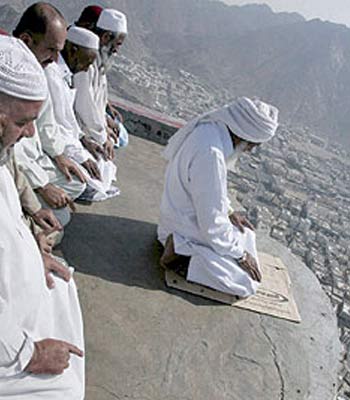
Muslim pilgrims in Mecca (AP)
JEDDAH, Saudi Arabia (AFP) -An estimated 2.5 million Muslims have begun their annual hajj or pilgrimage in Saudi Arabia with the authorities on high alert to prevent another tragedy after a deadly hotel collapse.
The pilgrims began the trek from the holy city of Mecca to the nearby valley of Mina after dawn prayers, tracing the journey made by Prophet Mohammed more than 1,400 years ago.
The rites, known as the hajj, started Sunday three days after a hostel in the heart of Mecca collapsed, killing 76 people, the latest deadly disaster to strike the pilgrimage.
Saudi authorities called off rescue operations Friday and the rubble of the Luluat al-Kheir (Pearl of Grace) hostel was removed to allow a sea of pilgrims to flow from Mecca to Mina, five kilometres (three miles) to the east.
The hajj is one of the five pillars of Islam and a once-in-a-lifetime obligation for all devout, able-bodied Muslims with the means to make the journey.
Men and women of all age, colour and nationality dressed in white robes and sandals started marching on foot or boarded buses to Mina after dawn prayers.
They will spend the day known as “Yawm at-Tarwiya” in prayers and meditation, sleeping at night in fire-proof tents before heading further south on Monday to Mount Arafat for the climax of the hajj.
Balloons and national flags fluttered above the white tents covering the arid valley to guide pilgrims.
Hundreds of security force members in military fatigues fanned out in the area while Asian labourers in orange jumpsuits swept the streets.
Even some of those wounded in Thursday’s building collapse will leave their hospital beds and go to Mina in specially-equipped ambulances, a senior health official said.
“The custodian of the two holy shrines (Saudi’s King Abdullah) ordered it,” said Khaled al-Samiri. “God has ordained the kingdom to serve this sacred spot and the pilgrims.”
Almost 60,000 security, health, emergency and other personnel are involved in organising the hajj this year, trying to make sure none of the deadly incidents that have marred it in recent years are repeated.
King Abdullah, members of the royal family and the religious establishment and several ministers have come to Mecca to be close to the progression of the hajj, which is a matter of national pride for the ultra-conservative kingdom that considers itself a beacon for the world’s estimated 1.3 billion Muslims.
In addition to stampedes that killed 251 pilgrims in 2004 and 1,426 in 1990 and a camp fire in 1997 in which 343 perished, authorities have to tackle the threat of disease, rioting and terrorist attacks.
The health ministry said it was not worried about avian flu, which has killed three children in Turkey over the past week and nearly 40 people in Asia last year.
“All the pilgrims that already came in are disease free,” said spokesman Khaled al-Mirghalani.
Pilgrims were required to show proof they were vaccinated for common contagious diseases before being allowed into the country.
Samiri said 9,600 doctors, medics and other staff were on standby at 14 hospitals, clinics and field facilities, while hundreds of ambulances and helicopters are on standby.
“I feel relaxed that we are ready, the rest is in God’s hands,” said Tariq al-Arnous, the head of emergency operations at the health ministry.
A similar attitude was echoed by some of the pilgrims leaving for Mina.
“Whatever God ordained will happen,” said Ahmed Omar, 40, from Somalia, accompanied by his wife and his wheelchair-bound mother-in-law.
Another pilgrim from Yemen said he was worried about potential accidents after the hotel collapse.
“But I must do this for God,” said Qaed Mehdi, 50.
The most perilous rite of the pilgrimage will take place on Tuesday when pilgrims flock back to Mina from Arafat to stone three pillars symbolising the powers of the devil. The area is the scene of most of the deadly stampedes.

Muslim pilgrims pray inside and outside the Great Mosque in Mecca (AP)

Muslim pilgrims pray inside and outside the Great Mosque in Mecca (AP)
